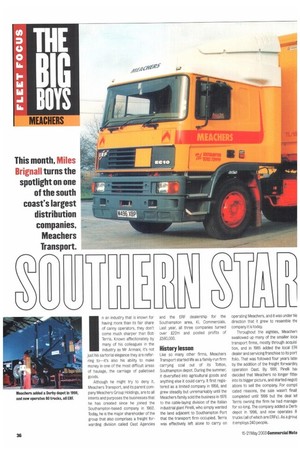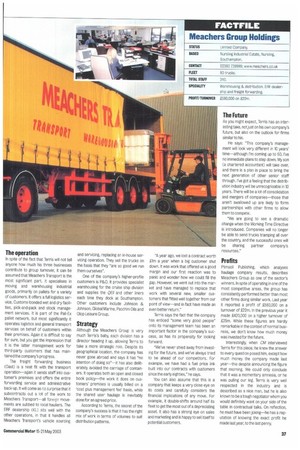This month, Miles Brignall turns the spotlight on one of
Page 36

Page 37

If you've noticed an error in this article please click here to report it so we can fix it.
the south coast's largest distribution companies, Meachers Transport. 1 n an industry that is known for
having more than its fair share of canny operators, they don't come much sharper than Bob Terris. Known affectionately by many of his colleagues in the industry as Mr Armani, it's not just his sartorial elegance they are referring to—it's also his ability to make money in one of the most difficult areas of haulage, the carriage of palletised goods.
Although he might try to deny it. Meachers Transport, and its parent company Meachers Group Holdings, are to all intents and purposes the businesses that he has created since he joined the Southampton-based company in 1962. Today, he is the major shareholder of the group that also comprises a freight forwarding division called Oast Agencies and the ERE dealership for the Southampton area, KL Commercials. Last year, all three companies turned over £22m and posted profits of £580,000.
History lesson Like so many other firms, Meachers Transport started life as a family-run firm carrying coal out of its Totton, Southampton depot. During the summer, it diversified into agricultural goods and anything else it could carry It first registered as a limited company in 1958, and grew steadily but unremarkably until the Meachers family sold the business in 1976 to the cable-laying division of the Italian industrial giant Pirelli, who simply wanted the land adjacent to Southampton Port that the transport firm occupied. Terris was effectively left alone to carry on
operating Meachers, and it was under hiE direction that it grew to resemble thE company it is today.
Throughout the eighties, Meacher: swallowed up many of the smaller loca transport firms, mostly through acquisi tion, and in 1985 added the local ERI dealer and servicing franchise to its port folio. That was followed four years latei by the addition of the freight forwardini operation Oast, By 1991, Pirelli ha( decided that Meachers no longer fittei into its bigger picture, and started negoti ations to sell the company For comph cated reasons, the sale wasn't finall completed until 1996 but the deal lei Terris owning the firm he had manage( for so long. The company added a Derb depot in 1998, and now operates a trucks (all of which are ERFs). As a grour it employs 240 people. The operation
In spite of the fact that Terris will not tell anyone how much his three businesses contribute to group turnover, it can be assumed that Meachers Transport is the most significant part. It specialises in moving and warehousing industrial goods, primarily on pallets for a variety of customers. It offers a full logistics service, Customs-bonded wet and dry facilities, pick-and-pack and stock management services. It is part of the Pall-Ex pallet network, but most significantly it operates logistics and general transport services on behalf of customers within their premises. Again it is difficult to say for sure, but you get the impression that it is the latter management work for third-party customers that has maintained the company's progress.
The freight forwarding business (Oast) is a neat fit with the transport operation—again it sends staff into customer's premises and offers the entire forwarding service and administrative back-up. It will come as rio surprise that it subcontracts out a lot of the work to Meachers Transport—all foreign movements are subbed to local hauliers. The ERF dealership (KL) sits well with the other operations, in that it handles all Meachers Transport's vehicle sourcing and servicing, replacing an in-house servicing operation. They sell the trucks on the basis that they "are so good we run them ourselves".
One of the company's higher-profile customers is P&a It provides specialist warehousing for the cruise ship division and supplies the QE11 and other liners each time they dock at Southampton. Other customers include Johnson & Johnson, Global Marine, Pacchini Oils and Olop Leisure Group.
Strategy
Although the Meachers Group is very much Terris's baby, each division has a director heading it up, allowing Terris to take a more strategic role, Despite its geographical location, the company has never gone abroad and says it has "no intention of doing so"—it has also deliberately avoided the carriage of containers, it operates both an open and closed book policy—the work it does on customers' premises is usually billed on a 'cost plus management fee' basis, while the shared user haulage is inevitably done for an agreed price.
According to Terris, the secret of the company's success is that it has the right mix of work in terms of volumes to suit distribution patterns. "A year ago, we lost a contract worth Elm a year when a big customer shut down. It was work that offered us a good margin and our first reaction was to panic and wonder how we could fill the gap. However, we went out into the market and have managed to replace that work with several new, smaller customers that fitted well together from our point of view—and in fact have made an even better return."
Terris says the fact that the company has enticed "some very good people" onto its management team has been an important factor in the company's success, as has its propensity for looking forward.
"We've never shied away from investing for the future, and we've always tried to be ahead of our competitors. For example, we have had a fuel price link built into our contracts with customers since the early eighties," he says.
You can also assume that this is a company that keeps a very close eye on its costs and carefully considers the financial implications of any move. For example, it double-shifts around half its fleet to get the most out of a depreciating asset. It also has a strong eye on sales and marketing and is happy to sell itself to potential customers.
The Future
As you might expect, Terris has an interesting take, not just on his own company's future, but also on the outlook for firms similar to his.
He says: "This company's management will look very different in 10 years' time—although I'm coming up to 60, I've no immediate plans to step down. My son (a chartered accountant) will take over, and there is a plan in place to bring the next generation of other senior staff through. I've got a feeling that the distribution industry will be unrecognisable in 10 years. There will be a lot of consolidation and mergers of companies—those that aren't swallowed up are likely to form partnerships with other firms to allow them to compete.
"We are going to see a dramatic change when the Working Time Directive is introduced. Companies will no longer be able to send trucks tramping all over the country, and the successful ones will be sharing partner company's resources."
Profits
Plimsoll Publishing, which analyses haulage company results, describes Meachers Group as one of the sector's winners. In spite of operating in one of the most competitive areas, the group has consistently performed better than most other firms doing similar work. Last year it reported a profit of 1580,000 on a turnover of 1,22m. In the previous year it made 1420,000 on a higher turnover of 125m. While these figures are hardly remarkable in the context of normal business, we don't know how much money was invested for the future.
Interestingly, when CM interviewed Terris for this piece, he knew the answer to every question posed him, except how much money the company made last year—this despite announcing the figure that morning. We could only conclude that it was a momentary amnesia, or he was pulling our leg. Terris is very well respected in the industry and is described as a nice man, but he is also known to be a tough negotiator whom you would definitely want on your side of the table in contractual talks. On reflection, he must have been joking—he has a reputation of knowing the exact profit he made last year, to the last penny.




























































































































































